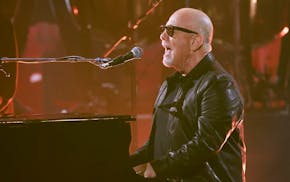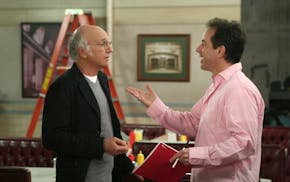LOS ANGELES
Last time you went to a clinic, chances were good that your primary doctor was of South Asian descent -- unless you happened to check into a TV hospital.
Fox's "The Mindy Project," a new sitcom about a lovesick ob/gyn, is the first series on broadcast television to feature an Indian-American in the lead role, a milestone that writer/star Mindy Kaling does her best to downplay.
"There's a saying that I really believe in when it comes to my 'Indianness,'" said "The Office" veteran. "I try not to rely on it nor deny it."
What Kaling and the rest of Hollywood can't deny is that the industry has made little progress in putting minority actors in leading roles.
While there's a steady stream of great minority character actors playing diner owners, community-college students and even physicists, they rarely get to be the star. The only returning broadcast shows with that distinction are ABC's "Scandal," featuring Kerry Washington, and CW's low-rated "Nikita," with Maggie Q.
That lack of diversity was glaring at TV's Emmy Awards two weeks ago. Of the 25 performers nominated for leading roles in a drama or comedy, only one was a minority actor, Don Cheadle, for "House of Lies."
Lance Reddick, a supporting player on Fox's "Fringe," said he isn't optimistic about the future, especially after his experience as a cast member of "The Wire." That HBO series is now considered a masterpiece, but during its 2002-08 run it failed to attract a significant audience or a single Emmy nomination for its largely black cast.
"I'm not holding my breath for acknowledgment of African-American talent," he said.
Reddick and many of his peers thought the landscape would change when Andre Braugher took home a leading-actor Emmy in 1998 for his work on "Homicide: Life on the Street," becoming only the third black actor to win in that category (Bill Cosby and James Earl Jones got there first). But in the 14 years since, it's seen only one minority nominee: Braugher again, for the swiftly canceled medical drama "Gideon's Crossing."
It's even worse for women. No actress of color ever has won for a dramatic lead role. And the last nomination? Way back in 1994, when Cicely Tyson got one for the short-lived drama "Sweet Justice."
As for comedy, only two people of color have been nominated for lead roles in the past 20 years: Tony Shalhoub, who won three times for "Monk," and America Ferrera, a winner for "Ugly Betty."
Behind the lens
Braugher hopes to get another crack at a lead-actor Emmy with his new ABC series, "Last Resort," in which he stars as a U.S. submarine captain who turns renegade after his government orders him to nuke Pakistan. Braugher, who won a second Emmy in 2007 for the miniseries "Thief," hopes his success is making a difference, but it's hard for him to gauge.
"The only thing I can suggest is that the wins weren't a blip, that it's part of a progression, but it runs at its own pace and I don't have control or the solution," he said.
Lack of control may be an understatement. Few non-whites have ever run a major network's entertainment division. Scott Sassa, an Asian-American executive, helmed NBC's programming in 1998-99; current CBS Entertainment President Nancy Tessler is half Puerto Rican.
It's no coincidence that three of TV's most diverse series -- "Grey's Anatomy," "Scandal" and "Private Practice" -- are run by a black woman, Shonda Rhimes.
Why is the industry falling short? David Simon, who created "The Wire" and "Treme" for HBO, compares the situation to the urban phenomenon of "white flight."
"A black sidekick here and there, no problem," he said. "A couple less-than-central characters in an ensemble piece, OK. It makes us all feel better about ourselves. Anything beyond that and 'There goes the neighborhood.' The only difference is that the metric isn't home sales and housing values. It's ratings and advertising. Never forget: The entertainment industry is 96.9 percent about money."
Networks misread what audiences want, says John Cho, who plays a radio-station manager on Matthew Perry's latest sitcom, "Go On."
"Producers are naturally risk-averse," said Cho, best known as one-half of the munchies-craving movie duo Harold and Kumar. "But there's no actual risk, any more than there is hiring a white standup that nobody has heard of and giving him a sitcom."
That may be true when it comes to sitcoms, which have meant great success to Bill Cosby, George Lopez and Martin Lawrence, but only a few minority-led network dramas -- notably "The Unit," "Boston Public," "NCIS: LA" -- have come close to being a hit.
That the print publicity campaign for "Last Resort" features a young white actor, Scott Speedman, instead of Braugher may be merely an attempt to woo female viewers. Still, it comes across as a slight.
The influence on kids
The lack of diversity in leading parts is not only hurting minority actors; it may also affect the next generation of Americans. According to a recent study, black children in the Midwest come away with less self-esteem after being exposed to television; the opposite is true for white boys.
"Regardless of what show you're watching, if you're a white male, things in life are pretty good for you," Indiana University Prof. Nicole Martins said. "You tend to be in positions of power, you have prestigious occupations, high education, glamorous houses, a beautiful wife. ... Young black boys are getting the opposite message: There are not a lot of good things you can aspire to."
Louis Gossett Jr., an Emmy winner for 1977's "Roots," also worries about our children: "We have to remember that the medium is the message. If they get the proper message, they'll know that African-Americans are not just gangbangers, but they're doctors and lawyers and mothers and fathers. And presidents. This is a responsibility of ours."
"The Mindy Project" is a step in the right direction, but progressive producers such as Braugher's current boss, Shawn Ryan -- who also cast black actor Dennis Haysbert as lead for "The Unit" -- know that Kaling's "Indianness" will remain an issue until there are more diverse faces on TV.
"I actually do believe that Hollywood is the kind of place where merit is rewarded," said Ryan. "It will be nice when these questions don't get asked anymore and Andre can just be an actor getting praise for his performance."
njustin@startribune.com • 612-673-7431 • Twitter: @nealjustin

CBS will turn the lights back on for Billy Joel concert

TV to watch: Billy Joel offers concert for those of us who aren't big shots

Justin: 10 TV shows about the Founding Fathers that are more fun than Apple's 'Franklin'

TV review: Robert Downey Jr. spoils 'The Sympathizer'

